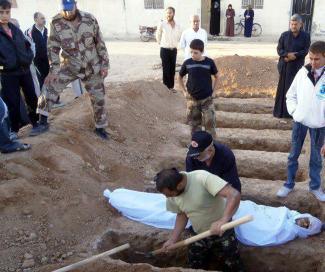War stories
Narrating the unspeakable

Describing the horrors, fears and memories of war is about separating truth from propaganda. It raises the question: Who is in control of the narrative? The immediacy of information passed on via smartphone gives people the impression of getting "truthful" rather than "filtered" information. Things are more complicated however.
That many unheard voices now have a medium for expression thanks to the Internet serves the freedom of articulation, experts agree. The problem is that professional media, under pressure from dwindling advertising revenues, have been reducing on-the-ground reporting. It is cheaper to rely on images from the Internet. Gruesome pictures, however, often do not convey who the perpetrators really are.
Professional media-outlets, moreover, increasingly interview experts from humanitarian organisations and other interest groups rather than relying on their own reporters whose job is to paint a balanced picture. Philip Gourevitch of the New Yorker magazine says: "The key downside of the humanitarian and human-rights lobby on journalism is a focus on victim-and-criminal reading of politics." He argues that it is impossible to understand and solve conflicts without involving both sides. Local leaders and interest groups must be involved, including perpetrators of violence. Gourevitch regrets that the implicit message of media coverage today tends to be that the international community must act: "Send troops, send criminal prosecutors, send people to The Hague." The lack of professional reporting makes it easier for all interested parties, including governments, to control stories. After 108 people were massacred in the Syrian town of Houla in 2012, for instance, conflicting accounts about the culprits led to widespread confusion. Early reports had blamed Shabiha, a pro-government militia, but later other news were spread according to which anti-government militants were responsible.
Abdulkader Al Dhon says the Syrian regime manipulated the media to deliver its version of the story. He is a 28 year old Syrian pro-democracy activist who now lives in Turkey. He shared his experience during a series of events concerning war stories that was organised by Berlin’s Haus der Kulturen der Welt (HKW – House of World Cultures). As Al Dhon pointed out, a UN report blamed the Syrian government. He says he visited the town right after the massacre and eyewitnesses there agreed with the UN assessment.
Al Dohn is aware of specific groups shaping narratives to promote their cause. He met young European jihadists in Syria and found it irritating that these "outsiders" kept asking people whether they were Sunni Muslims or belonged to another Islamic denomination.
Many people who know the region well are uneasy with recent international media coverage portraying tensions in the Middle East as a consequence of the divide between Shia and Sunni Muslims. In Al Dhon’s eyes, the European jihadist’s sectarian attitude does not help his country. "Syrian people like me are fighting for a better future," he says, "but these people want to divide the Syrian people."
Forces actively engaged in conflicts are often adept at using the internet to spread information in support of their cause. Other voices would be relevant too – but they are not organised and tend to remain silent. Victims, after all, are traumatised and often feel helpless. Most of them are unable to spread their views in any systematic manner.
Their experience matters, however. Telling one’s story helps to make sense of horrible events that seem utterly senseless, says Carolin Emcke, one of the hosts at HKW. Unless victims regain their voice at some point in time, they cannot find a new and healthy sense of identity.
Perpetrators of violence, on the other hand, also tend to be deformed by civic strife, says Emcke. Before the conflict, many had no idea they could torture and kill. Many are ashamed of their deeds and want to hush things up. Breaking the silence is important on either side, Emcke says and adds: "This is not linear, it is broken, has gaps and moments of silence." It is a long-term issue, not something to be downloaded from the web.
Ellen Thalman







